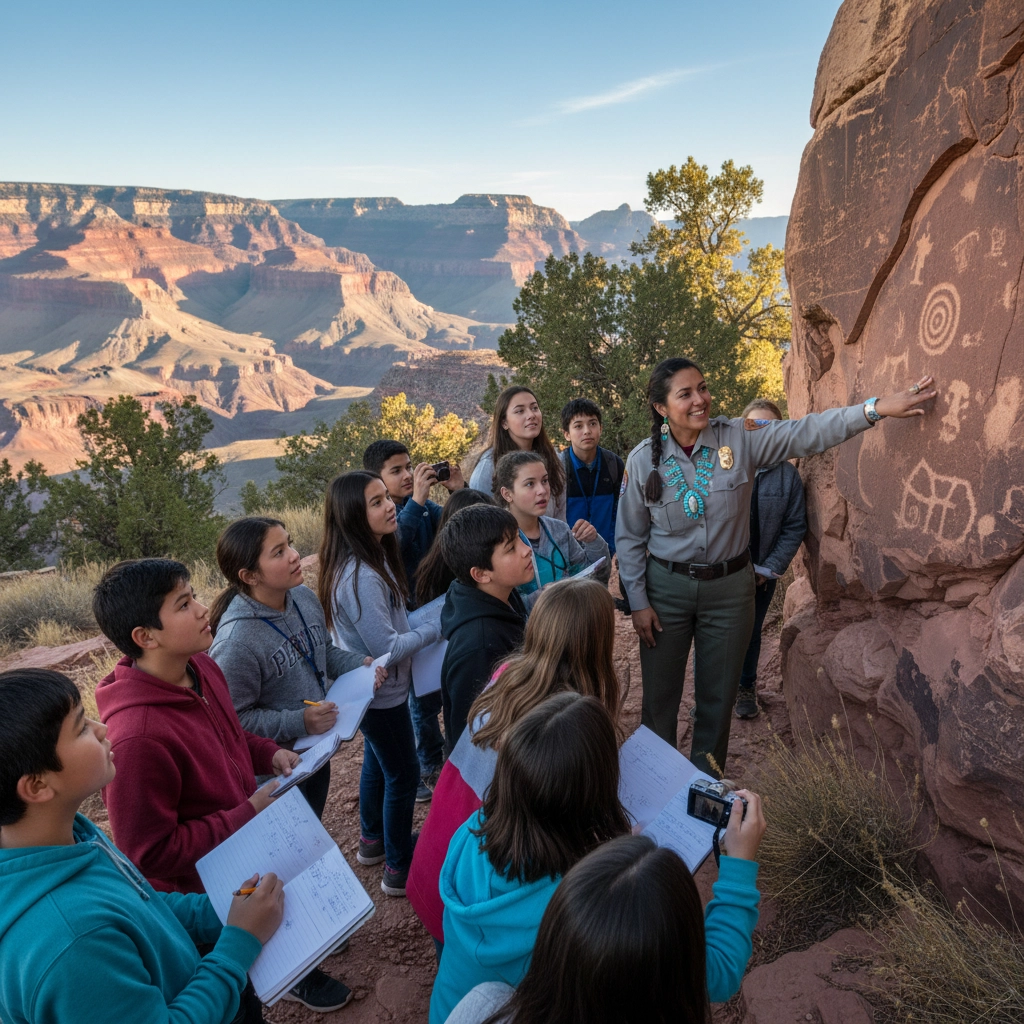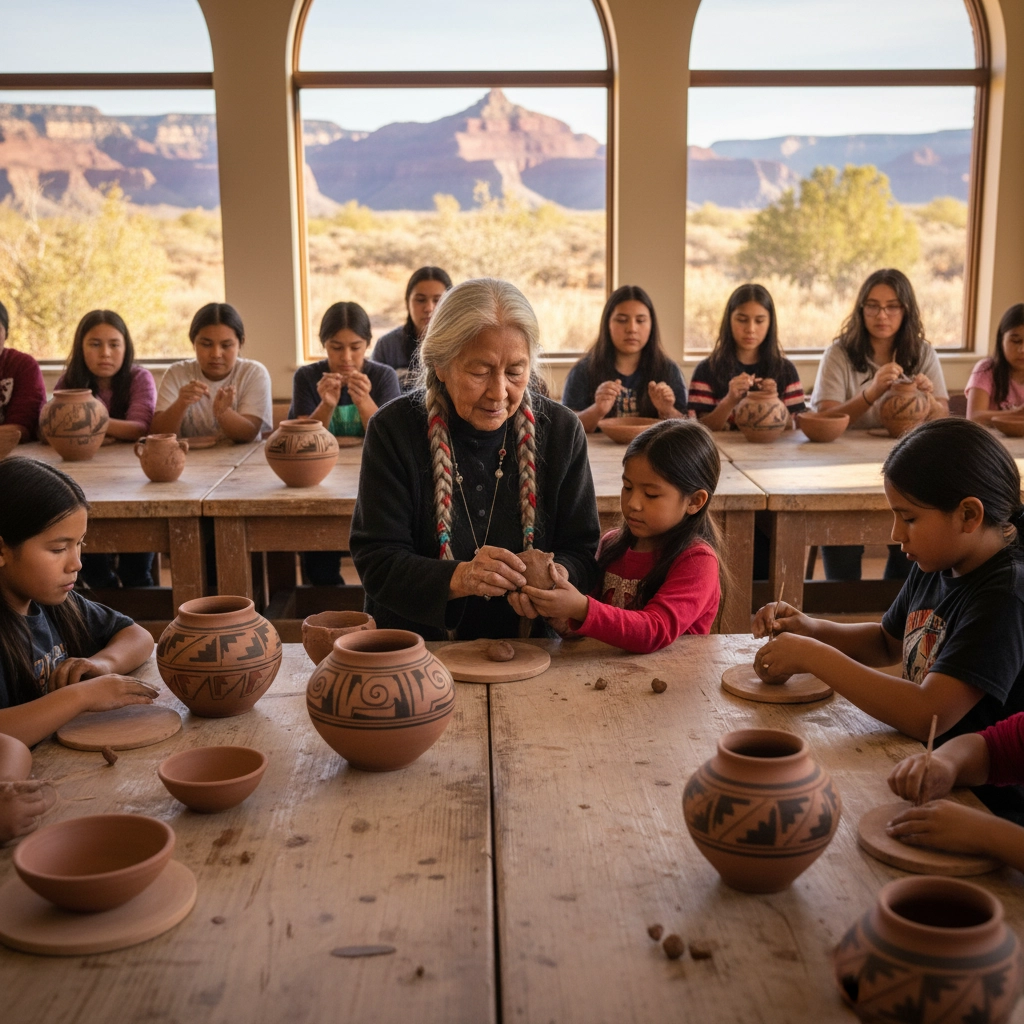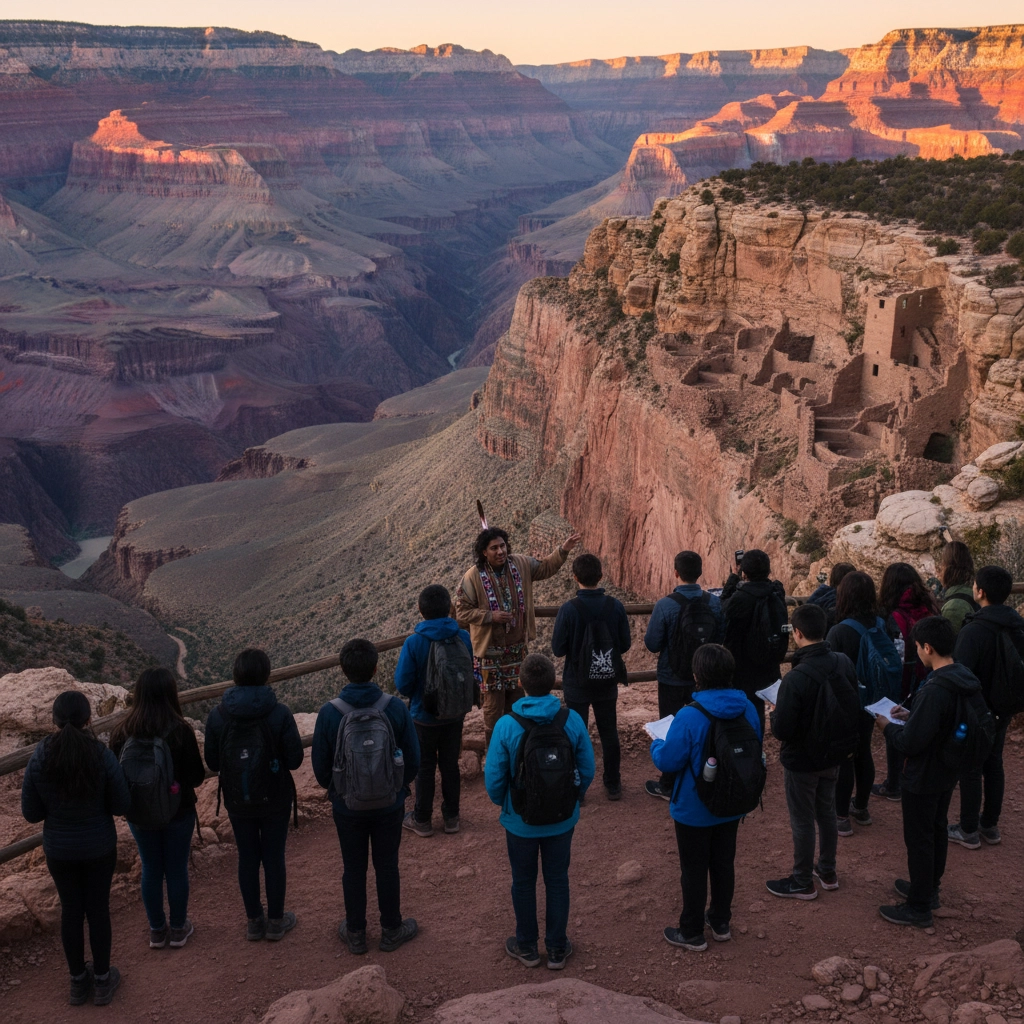The Ultimate Guide to Fall Educational Trips: Why November is the Perfect Time for Grand Canyon School Adventures
- Caleb Mullenix
- Nov 3, 2025
- 5 min read
Planning an educational trip that maximizes student learning while ensuring optimal conditions requires strategic timing and thorough preparation. November emerges as the premier month for Grand Canyon educational expeditions, offering educators a unique combination of favorable weather, reduced crowds, and exceptional opportunities to explore Native American heritage and cultural understanding.
The Strategic Advantages of November Educational Travel
Optimal Weather Conditions for Student Learning
November provides the ideal climate conditions for educational activities at the Grand Canyon. Temperatures typically range from comfortable mid-50s to pleasant mid-70s Fahrenheit, eliminating the extreme heat challenges of summer months that can impede outdoor learning activities. This moderate climate allows students to participate fully in hiking programs, outdoor ranger presentations, and extended observation periods without weather-related distractions or safety concerns.
The reduced precipitation during November further enhances educational opportunities. Clear skies provide optimal visibility for geological observations and photography projects, while stable weather conditions ensure that scheduled educational programs proceed without weather-related cancellations.
Reduced Visitor Volume Enhances Educational Focus
The shoulder season characteristics of November create significantly improved learning environments for student groups. Reduced crowd density translates directly into enhanced educational experiences through improved access to exhibits, more personalized ranger interactions, and quieter environments conducive to focused learning and discussion.
Educational groups benefit from easier navigation of visitor centers, reduced wait times for presentations, and improved opportunities for students to ask questions during ranger-led programs. This environment allows educators to maintain better supervision while facilitating meaningful educational discussions without competing for space or attention.

Native American Cultural Learning Opportunities in November
Seasonal Cultural Programs and Celebrations
November presents unique opportunities for students to engage with Native American cultural education through seasonal programs and traditional practices. Many tribal communities in the Grand Canyon region observe autumn traditions that align with educational objectives, providing authentic cultural learning experiences.
The cooler November weather creates ideal conditions for participating in traditional outdoor activities and cultural demonstrations. Students can experience traditional food preparation methods, observe seasonal craft-making techniques, and participate in educational programs that highlight the historical and contemporary significance of autumn in Native American communities.
Enhanced Access to Tribal Cultural Centers
November's reduced tourist volume provides educational groups with improved access to tribal cultural centers and museums throughout the Grand Canyon region. The Hualapai Tribe, Havasupai Tribe, and Navajo Nation offer educational programs specifically designed for student groups, with November scheduling providing more personalized attention and in-depth cultural exchange opportunities.
Educational coordinators can arrange visits to tribal cultural centers where students engage directly with Native American educators and cultural practitioners. These interactions provide authentic perspectives on historical events, traditional ecological knowledge, and contemporary tribal life that supplement textbook learning with lived experience and cultural wisdom.
Educational Programs Designed for Student Success
Junior Ranger Programs with Native American Focus
The Grand Canyon's Junior Ranger Program incorporates significant Native American cultural education components that align perfectly with educational standards. Students aged 4-14 complete structured activities exploring tribal history, traditional land use practices, and contemporary Native American contributions to park stewardship and conservation.
November participation in Junior Ranger Programs allows for more personalized instruction and deeper exploration of cultural topics. Rangers can dedicate additional time to discussing tribal perspectives on Grand Canyon formation stories, traditional ecological practices, and the ongoing relationships between tribal communities and park management.
Specialized Educational Tours and Cultural Immersion
Educational tour operators offer specialized November programs focusing specifically on Native American cultural education. These programs include guided visits to ancient dwelling sites, traditional food gathering locations, and culturally significant landscape features that provide context for understanding indigenous relationships with the Grand Canyon environment.
Arrange guided tours with Native American cultural educators who provide direct instruction on traditional ecological knowledge, seasonal resource management practices, and the cultural significance of specific Grand Canyon features. These immersive educational experiences create lasting connections between students and indigenous perspectives on environmental stewardship.

Practical Implementation Strategies for Educators
Pre-Trip Cultural Preparation Requirements
Begin cultural education preparation several weeks before departure by introducing students to the diverse tribal communities associated with the Grand Canyon region. Create comprehensive background materials covering the Hualapai, Havasupai, Navajo, Hopi, and Paiute tribes, emphasizing their distinct cultural traditions, languages, and historical relationships with the Grand Canyon landscape.
Establish clear cultural respect protocols and appropriate behavior expectations for interacting with tribal cultural sites, educators, and community members. Discuss the importance of approaching Native American cultural education with respect, curiosity, and openness to perspectives that may differ from mainstream historical narratives.
Curriculum Integration and Standards Alignment
Develop lesson plans that integrate Native American cultural education with existing curriculum standards in social studies, environmental science, and cultural geography. Create pre-trip assignments that encourage students to research specific tribal communities and prepare thoughtful questions for cultural educators and tribal representatives.
Design post-trip reflection activities that encourage students to connect Native American traditional ecological knowledge with contemporary environmental science concepts. Establish ongoing projects that allow students to explore connections between indigenous cultural practices and modern conservation efforts.
Safety and Cultural Sensitivity Protocols
Implement comprehensive safety protocols that account for both physical safety requirements and cultural sensitivity guidelines. Establish clear expectations for respectful behavior during cultural site visits, appropriate photography protocols, and guidelines for asking questions during cultural presentations.
Communicate with tribal cultural centers and educational coordinators well in advance to ensure programs align with your educational objectives while respecting tribal protocols and cultural guidelines. Confirm that all planned activities demonstrate appropriate respect for sacred sites and cultural practices.
Logistical Planning for November Success
Accommodation and Transportation Considerations
Secure accommodations well in advance to take advantage of November's reduced demand while ensuring availability for your group size. November bookings often provide better value and improved service quality compared to peak season alternatives.
Coordinate transportation arrangements that account for November's shorter daylight hours and potential weather variations. Plan arrival and departure times that maximize educational opportunities while accounting for seasonal schedule adjustments at cultural centers and educational facilities.

Budget Optimization Strategies
November travel typically offers significant cost advantages compared to peak season pricing. Develop comprehensive budgets that account for reduced accommodation costs, potential group discounts, and improved availability of educational programs during shoulder season periods.
Allocate budget resources to enhance cultural education components through extended programs, specialized cultural educators, and authentic cultural experiences that provide exceptional educational value. Consider November's cost savings as opportunities to invest in higher-quality educational programming and cultural immersion experiences.
Emergency Preparedness and Communication
Establish comprehensive emergency communication protocols that account for potential weather variations and ensure consistent contact with school administration, parents, and emergency services. Prepare contingency plans for potential schedule adjustments while maintaining educational objectives.
Create detailed itineraries that include emergency contact information for tribal cultural centers, park services, and local medical facilities. Ensure all chaperones understand emergency procedures and cultural sensitivity requirements for all planned activities.
November represents the optimal timing for Grand Canyon educational expeditions that prioritize Native American cultural education alongside natural science learning. The combination of ideal weather conditions, reduced crowds, enhanced access to cultural programs, and cost-effective travel arrangements creates exceptional opportunities for transformative educational experiences.
Successful implementation requires thorough preparation, cultural sensitivity, and strategic coordination with tribal educators and cultural centers. By prioritizing respectful engagement with Native American cultural education and leveraging November's unique advantages, educators can provide students with profound learning experiences that foster cultural understanding, environmental appreciation, and lifelong connections to indigenous wisdom and perspectives.
Ready to create an unforgettable November Grand Canyon educational experience for your students? Appleseed Expeditions specializes in culturally-focused educational travel that transforms learning objectives into meaningful, hands-on experiences that students carry with them throughout their academic careers.



Comments